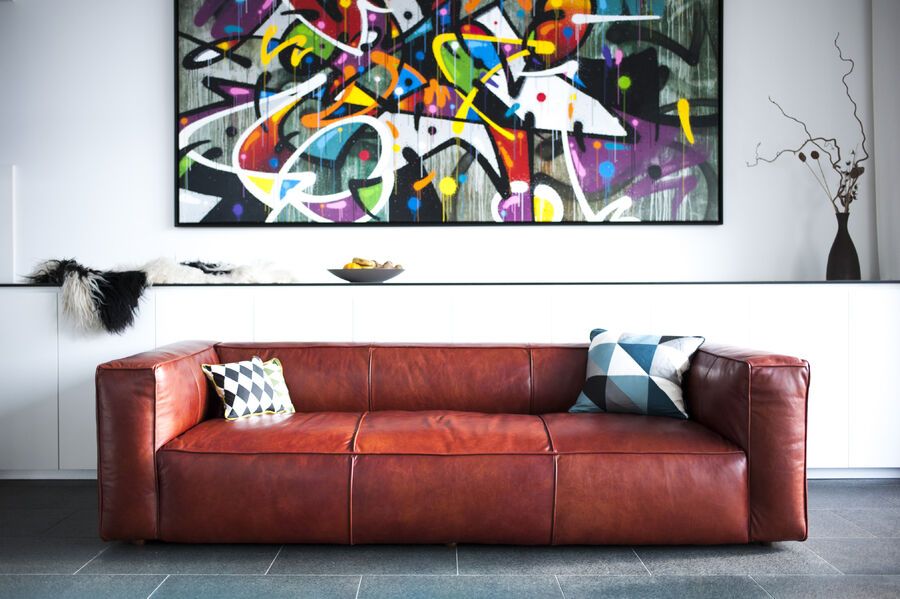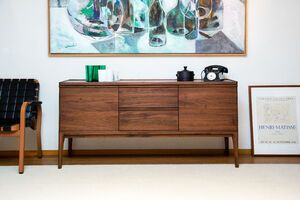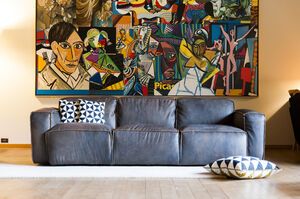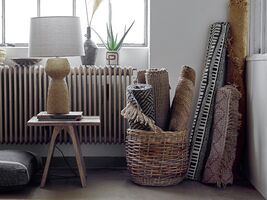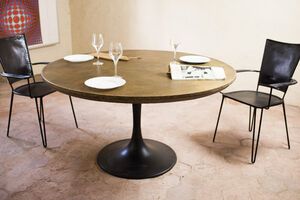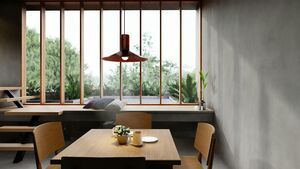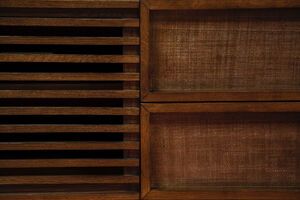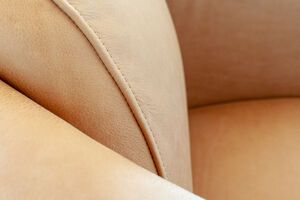Leather is not a fixed material. It breathes, it evolves, it develops a patina. Whether it covers a club armchair, a chair with clean lines or a generous sofa, full grain leather - especially aniline - deserves attention and care. Not out of whim, but to fully reveal its beauty, suppleness, and depth.
At pib, we select high-quality leathers for their natural feel and durability. These leathers are handcrafted, without any machine intervention. Originating from Argentina or Brazil, they have been selected from the top 5% of the world?s production.
This article guides you in maintaining your leather furniture: so it lasts, so it lives, so it tells you a story.
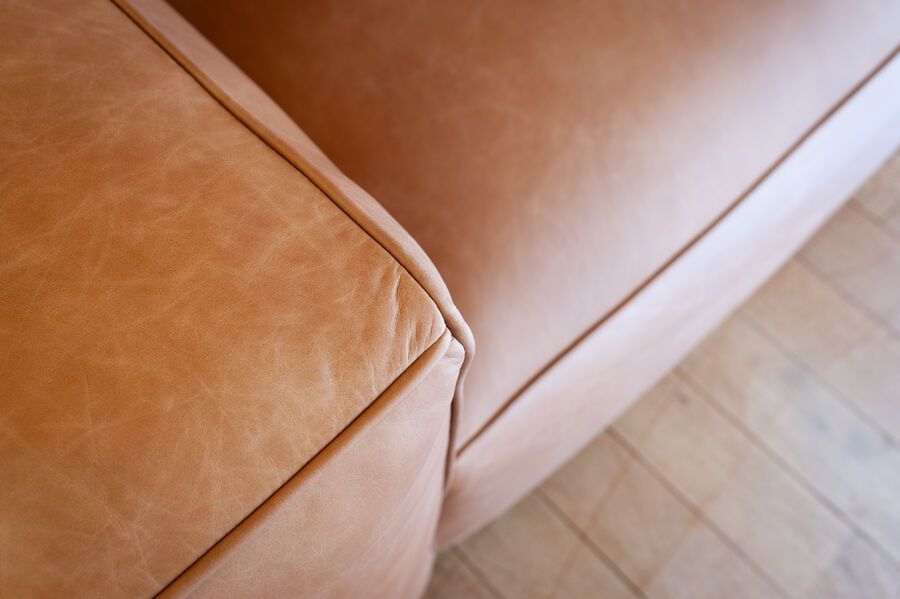
Almond sofa leather
Understanding the nature of leather
Before talking about cloths or creams, it is essential to understand what you are maintaining. Not all leathers are equal, neither in appearance nor in behavior.
Aniline full grain leather is the most noble: it preserves the natural irregularities of the hide, with subtle coloring and a touch of great richness. It breathes, absorbs, and evolves over time. It is a living material, unfiltered, that tells its story.
Semi-aniline leather receives a light protective coating: more tolerant in daily use, it remains faithful to the spirit of natural leather.
Pigmented or corrected leather is more heavily treated, but loses nuance and suppleness. As for split leather, it offers a more accessible approach, at the expense of touch and patina.
Knowing your leather means taking better care of it. And allowing it to age gracefully.
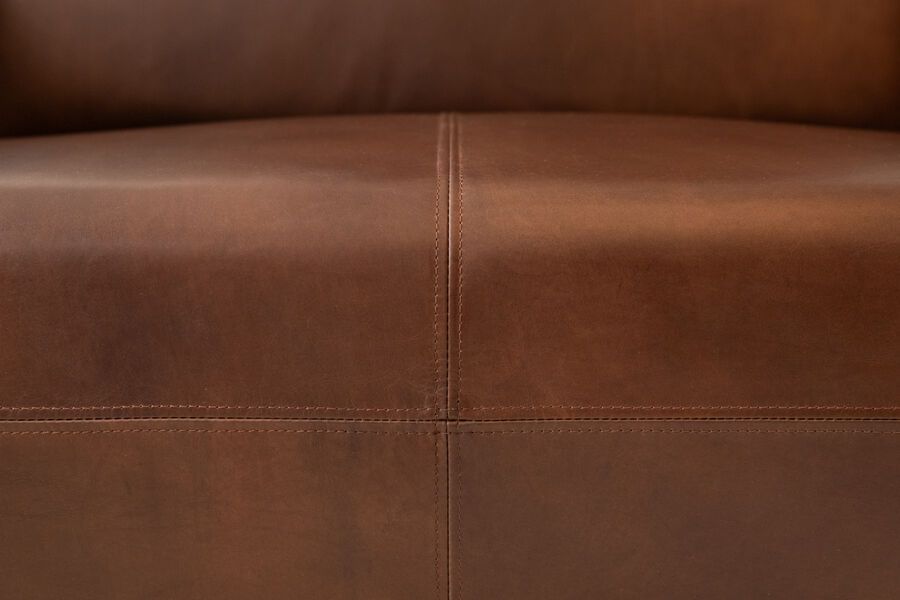
Red Baron sofa leather
The little enemies of leather
Leather does not fear life, it fears excess.
Direct light, first of all, alters the shades and dries out the material. Leather exposed too much to sunlight gradually loses its depth and suppleness. Similarly, excessive heat or a radiator placed too close can make it brittle.
On the other hand, stagnant humidity encourages mold. Air must circulate, without excess. A well-ventilated, temperate room is leather?s natural ally.
Conventional household products - wipes, strong soaps, degreasers - must be avoided. They damage finishes, distort coloring, and dry out the surface.
Finally, everyday gestures matter: repeated rubbing, contact with dark fabrics (especially raw denim), pets... all these interactions gradually mark the material.
Everyday maintenance
Leather requires little, but with regularity. The goal is not to make it shine, but to preserve it properly.
For aniline or semi-aniline full grain leathers, it is recommended to gently dust the surface once a week using a soft, dry cloth such as microfiber. This prevents the accumulation of particles that could damage the material over time.
For pigmented or corrected leathers, a slightly damp cloth can be used occasionally, as the finish offers more protection. Nevertheless, it is best to remain moderate in gestures to avoid premature wear.
In all cases, ensure good room ventilation, avoid prolonged direct light, and limit contact with abrasive or color-bleeding textiles. Discreet attention makes the difference.
Deep maintenance
Twice a year, more complete care helps nourish and preserve leather. But again, the nature of the material determines the right approach.
For aniline full grain leathers, sobriety is essential. Use a cloth very lightly dampened with lukewarm water to clean the surface without rubbing. Then apply a nourishing cream specifically for aniline leather - solvent-free, silicone-free, pH neutral. Choose products that penetrate without creating a shiny film. Let rest, then buff with a dry, soft cloth.
For semi-aniline leathers, the same care can be applied with a bit more peace of mind, the light protective coating limiting the risk of stains. The method is the same, avoiding excess product.
For pigmented leathers, a more thorough cleaning is possible, using a damp cloth and a mild leather soap. Nourishing is optional, or can be done with a more standard cream, suitable for protected leathers. Be careful, however, not to saturate the surface: even protected, leather deserves respect.
In all cases, always test the product on an inconspicuous area. And remember that too much care can sometimes be as harmful as none at all.
Patina and authenticity
A mark, a crease, a darker shade? On full grain leather, these are not flaws, but signs of life. They bear witness to time, to use, to the bond you create with your furniture.
Leather left on its own ages; leather that is maintained enriches.
This is the beauty of full grain leather: it erases nothing, it reveals everything. Provided it is respected.
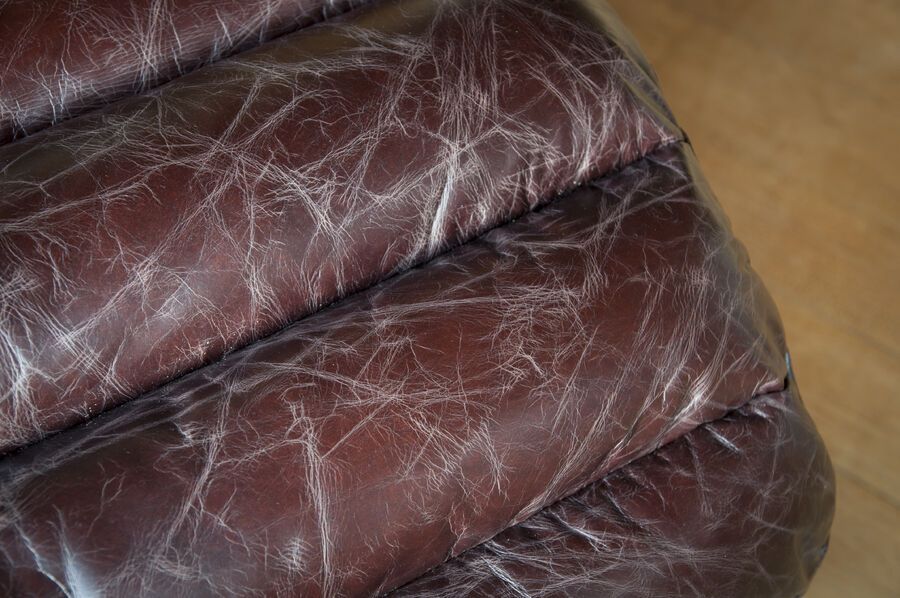
Weimar chair leather
Leather at pib: a philosophy of durability
Choosing leather is not just a matter of style. It reflects a way of designing objects: durable, sincere, able to withstand the years with grace.
Our full grain or semi-aniline leather collections are made to live, not just to decorate. They embody a sober, timeless aesthetic where the material speaks for itself.
From the patinated club armchair to the contemporary-lined sofa, each piece is a dialogue between comfort, refinement, and elegance. And each maintenance session becomes a way of honoring that relationship.
Conclusion: between care and transmission
Caring for your leather armchair or sofa is not a constraint. It is a simple, discreet, almost ritual gesture. A way of accompanying the material, prolonging its beauty, revealing its soul.
By respecting a few essential principles, you allow your furniture to develop a just patina, to age with character. So that it accompanies you for a long time, and maybe one day, accompanies other eyes, other lives.
For a beautiful object is not possessed, it is passed on.
